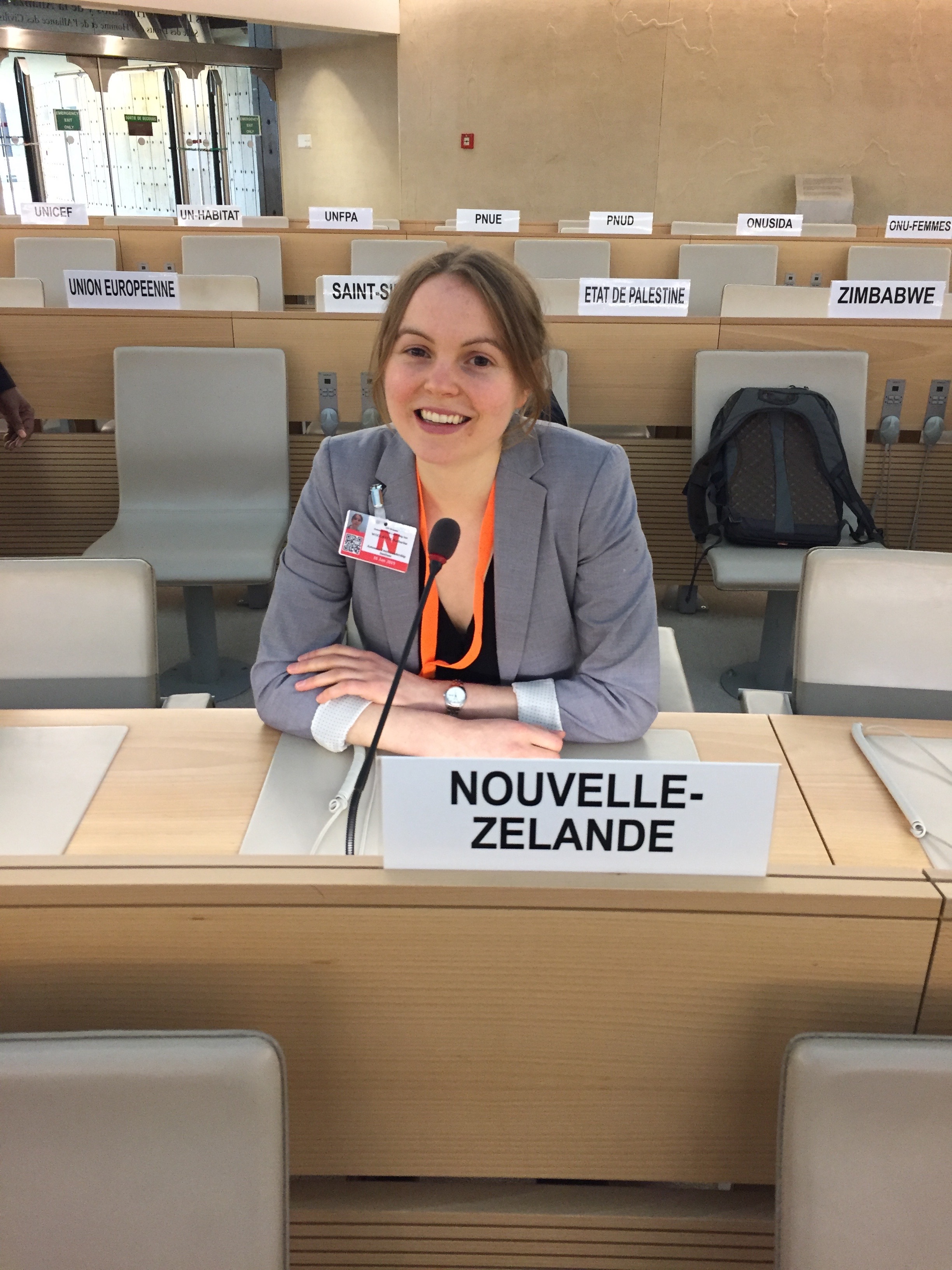AYLI delegates in the Human Rights Council room, where the Universal Periodic Review takes place.
On Monday, the New Zealand government faced its five-yearly human rights review at the United Nations in Geneva. In this third cycle of the Universal Periodic Review, Minister for Justice Andrew Little described the human rights challenges facing New Zealand before UN member states - from Syria to Norway - made recommendations on specific areas they believe New Zealand can improve in.
Predictably, amongst the dominant themes of the review were domestic violence, indigenous rights, education, justice, discrimination against LGBTI+ peoples, and the marginalisation of people with disabilities. But alongside these recurring recommendations, there were a few that seemed to come from left-field. Although the recommendations are yet to be published, here are three that struck us as more unusual:
Address Modern Day Slavery
There are more than 45 million people worldwide living in modern day slavery. Indeed, there is growing awareness that forced labour haunts much of our global economy, whether it be in the garment industry, the seafood industry, sex work, or even construction work. The remit of the UPR is however traditionally limited to the domestic human rights of a state. In other words: we usually shirk responsibility for human rights abuses that happen beyond our borders, even if our purchases make us complicit those abuses. This is why the United Kingdom’s focus on what New Zealand is doing to tackle slavery in global supply chains is so fascinating. The conversation needs to shift beyond what The Warehouse (for instance) is paying their staff in New Zealand, to what they’re paying the workers who produce their goods in Bangladesh, Cambodia and elsewhere. Legislation to require businesses to report transparently on where, and by who, their products are made would be a promising first step to accountability.
Increase Legal Aid for Women
While many states (including Estonia, France, Hungary, Ireland, Iceland, the Netherlands, and Myanmar) recommended New Zealand take action to address gender-based violence, Peru - and a few others, including Togo - suggested a unique means of doing this. They recommended increasing access to legal aid for women, particularly for Maori and migrant women. While not a preventative solution, we imagine Peru believes this would help facilitate prosecution, prevent reoffending and ultimately empower women. Amongst Peru’s other unique recommendations were that we ensure inclusive education for children with disabilities and harmonise our national legislation with indigenous rights.
Resource the Human Rights Commission
Spain recommended the New Zealand government endow our Human Rights Commission (HRC) with adequate resources to pursue their work. This recommendation stems from concerns expressed by the CEDAW Committee that the HRC has faced continual decreases in resources over recent years, and is also confined in its mandate by the Immigration Act, which prevents the Commission from accepting complaints from migrants. The HRC is our National Human Rights Institution (NHRI), the state-mandated but independent body tasked with protecting and promoting rights at the national level. NHRIs however only fulfil their crucial role if they are allowed the independence and autonomy outlined in the Paris Principles. Predictably however, because NHRIs are funded by the state, funding cuts may constrain their activities and limit their freedom. There are no allegations that this is taking place in New Zealand, with the HRC maintaining a ‘A’ rating, but Spain’s recommendation hints this might be an issue to watch.
Artwork by Miquel Barceló (2008) on the Human Rights Council ceiling: the artist used 30 tonnes of paint were used to cover the 1,500-square-meter dome ceiling.
Evidently, these sample recommendations aren’t representative of all 200+ recommendations given at the review, which will be published in their entirety on the OHCHR website. As for the presentation given by our new government, that was perhaps more interesting than all the recommendations combined.
Headlines reporting that Andrew Little told the UN ‘New Zealand is failing women and our justice system is broken’ were accurate, although probably not the most appropriate way to convey the process of the review back to New Zealand. The Minister for Justice’s forthright opening remarks were commendable, in that he refused to shy away from the real human rights issues facing New Zealanders. The impacts of colonisation, discrimination against LGBTI+ communities and people with disabilities, our poor record on mental health, over-representation of Maori in the justice system, gender-based violence, and much else besides was described with greater transparency than even the government’s own National Report. Of course, the government also took the opportunity to promote their ‘world first’ Wellbeing Budget, new Crown-Maori relations office Te Arawhiti, ambitions for an independent Climate Commission and just about every other initiative the new government has planned to ‘solve’ these problems. Yet the honesty displayed was in vast contrast to Judith Collins’ presentation at the last UPR in 2014, and indeed in vast contrast to the euphemistic presentations of the other states we witnessed under review this week.
This third review was a landmark for New Zealand, because of the quality - and honesty - of the government’s presentation, because of the breadth and depth of recommendations made, and - hopefully - because this cycle will be marked by the most effective follow-up and implementation of recommendations so far. But making the call on whether this review was a success or not will need to wait until our next review - so see you soon, 2024!



